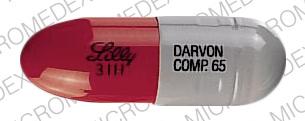Aspirin/caffeine/propoxyphene and Alcohol/Food Interactions
There are 5 alcohol/food/lifestyle interactions with aspirin / caffeine / propoxyphene.
Propoxyphene Food/Lifestyle
Major Food Interaction
Consumer information for this interaction is not currently available.
GENERALLY AVOID: Alcohol may have additive CNS- and/or respiratory-depressant effects with propoxyphene. Misuse of propoxyphene, either alone or in combination with other CNS depressants, has been a major cause of drug-related deaths, particularly in patients with a history of emotional disturbances, suicidal ideation, or alcohol and drug abuse. Concomitant use may result in additive CNS depression and impairment of judgment, thinking, and psychomotor skills. In more severe cases, hypotension, respiratory depression, profound sedation, coma, or even death may occur.
GENERALLY AVOID: Grapefruit or grapefruit juice may increase the plasma concentrations of propoxyphene by inhibiting its CYP450 3A4-mediated metabolism, although the interaction has not been studied. In general, the effect of grapefruit juice is concentration-, dose- and preparation-dependent, and can vary widely among brands. Certain preparations of grapefruit juice (e.g., high dose, double strength) have sometimes demonstrated potent inhibition of CYP450 3A4, while other preparations (e.g., low dose, single strength) have typically demonstrated moderate inhibition. Pharmacokinetic interactions involving grapefruit juice are also subject to a high degree of interpatient variability, thus the extent to which a given patient may be affected is difficult to predict. In addition, high serum levels of propoxyphene have been associated with QT interval prolongation and torsade de pointes arrhythmia.
MANAGEMENT: Patients should not consume alcoholic beverages or use drug products that contain alcohol during treatment with propoxyphene. Any history of alcohol or illicit drug use should be considered when prescribing propoxyphene, and therapy initiated at a lower dosage if necessary. Patients should be closely monitored for signs and symptoms of sedation, respiratory depression, and hypotension. Given the interindividual variability in the pharmacokinetics of propoxyphene, a significant interaction with grapefruit juice in certain patients cannot be ruled out. Patients should be advised to seek immediate medical attention if they experience symptoms that could indicate the occurrence of torsade de pointes such as dizziness, lightheadedness, fainting, palpitation, irregular heart rhythm, shortness of breath, or syncope.
Caffeine Food/Lifestyle
Minor Food Interaction
Information for this minor interaction is available on the professional version.
Switch to professional interaction data
Caffeine High Blood Pressure (Hypertension)
Major Potential Hazard, Moderate plausibility
CNS stimulants - cardiac disease
Many CNS stimulants are contraindicated in patients with significant cardiovascular impairment such as uncompensated heart failure, severe coronary disease, severe hypertension (including that associated with hyperthyroidism or pheochromocytoma), cardiac structural abnormalities, serious arrhythmias, etc. Sudden death has been reported in patients with structural cardiac abnormalities or other serious cardiac disease who are treated with CNS stimulants at the recommended dosages for attention deficit hyperactivity disorder; use of these agents should be avoided in patients with known structural cardiac abnormalities, cardiomyopathy, serious cardiac arrhythmia, coronary artery disease, or other serious cardiac disease. Additionally, stroke, myocardial infarction, chest pain, syncope, arrhythmias, and other symptoms have been reported in adults under treatment. A careful assessment of the cardiovascular status should be done in patients being considered for treatment. This includes family history, physical exam, and further cardiac evaluation (EKG and echocardiogram). Patients who develop symptoms should have a detailed cardiac evaluation and if needed, treatment should be suspended.
Caffeine High Blood Pressure (Hypertension)
Major Potential Hazard, Moderate plausibility
CNS stimulants - hypertension
CNS stimulants increase blood pressure and heart rate; the use of some agents may be contraindicated in patients with severe/uncontrolled hypertension. Caution should be used when administering to patients with preexisting high blood pressure (even mild hypertension) and other cardiovascular conditions. All patients under treatment should be regularly monitored for potential tachycardia and hypertension.
Caffeine High Blood Pressure (Hypertension)
Moderate Potential Hazard, Moderate plausibility
caffeine - cardiotoxicity
Like other methylxanthines, caffeine at high dosages may be associated with positive inotropic and chronotropic effects on the heart. Caffeine may also produce an increase in systemic vascular resistance, resulting in elevation of blood pressure. Therapy with products containing caffeine should be administered cautiously in patients with severe cardiac disease, hypertension, hyperthyroidism, or acute myocardial injury. Some clinicians recommend avoiding caffeine in patients with symptomatic cardiac arrhythmias and/or palpitations and during the first several days to weeks after an acute myocardial infarction.
Switch to professional interaction data
Aspirin/caffeine/propoxyphene drug interactions
There are 910 drug interactions with aspirin / caffeine / propoxyphene.
Aspirin/caffeine/propoxyphene disease interactions
There are 34 disease interactions with aspirin / caffeine / propoxyphene which include:
- coagulation
- cardiac disease
- hypertension
- psychiatric disorders
- PUD
- impaired GI motility
- infectious diarrhea
- prematurity
- asthma
- acute alcohol intoxication
- drug dependence
- hypotension
- intracranial pressure
- respiratory depression
- gastrointestinal obstruction
- GI toxicity
- renal dysfunction
- Reye's syndrome
- cardiotoxicity
- liver disease
- renal dysfunction
- seizure disorders
- GERD
- adrenal insufficiency
- liver disease
- renal dysfunction
- seizure disorders
- urinary retention
- arrhythmias
- biliary tract disease
- anemia
- dialysis
- G-6-PD deficiency
- hepatotoxicity
More about aspirin / caffeine / propoxyphene
- Check interactions
- Compare alternatives
- Reviews (7)
- Side effects
- Dosage information
- During pregnancy
- Drug class: narcotic analgesic combinations
Related treatment guides
Drug Interaction Classification
| Highly clinically significant. Avoid combinations; the risk of the interaction outweighs the benefit. | |
| Moderately clinically significant. Usually avoid combinations; use it only under special circumstances. | |
| Minimally clinically significant. Minimize risk; assess risk and consider an alternative drug, take steps to circumvent the interaction risk and/or institute a monitoring plan. | |
| No interaction information available. |
See also:
Further information
Always consult your healthcare provider to ensure the information displayed on this page applies to your personal circumstances.


